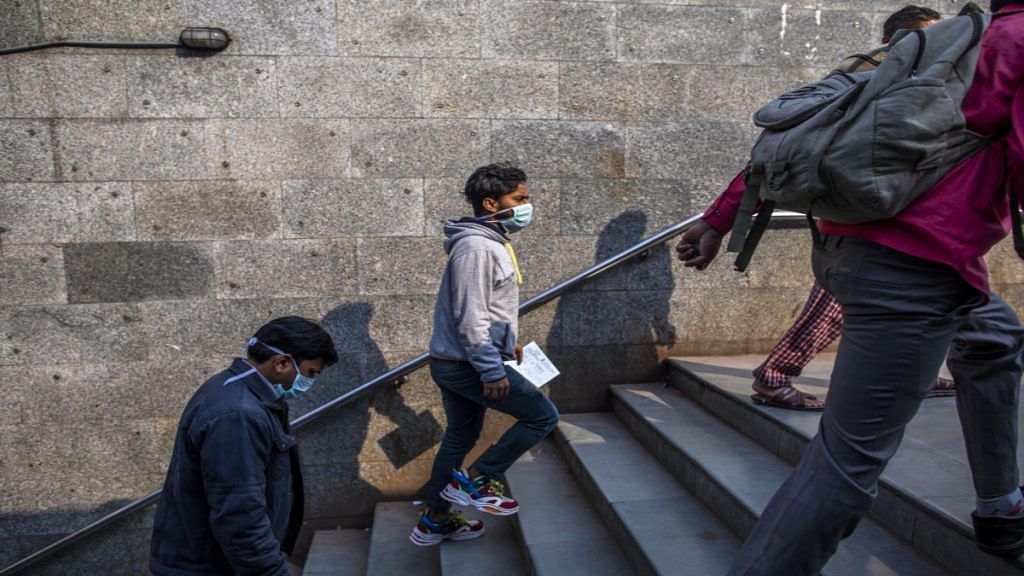New Delhi: India should move towards controlled release of the lockdown so its people develop herd immunity that leaves the virus ineffective, said Dr Jayaprakash Muliyil who is among India’s top epidemiologists.
And one way to do that is to allow the young to go out and do productive work and keep the elderly indoors, the former principal of Christian Medical College, Vellore, said in an exclusive interview to ThePrint.
With the national lockdown extended until 3 May, there are questions if India can survive its economic consequences. Speaking about this, Muliyil said, “When you block something, recovery can take time, India cannot afford to be bankrupt.”
How herd immunity is built in a community
Lockdowns may flatten the curve but cannot completely stall the infection, even if those with flu-like symptoms are separated and quarantined. Covid-19 virus will be active in those who remain asymptomatic, and hence undetectable unless more people are tested. Once these restrictions go with lockdowns lifted and people interact with each other, the virus can make a reappearance and restart the transmission.
In such cases, herd immunity can help, said Muliyil.
Viruses can survive in the population as long as there is a susceptible population to infect, and as more people are infected and they develop antibodies for it, an immunity builds up in the community, he explained.
Antibodies, specific to the viruses, are proteins generated by an infected person’s immune system.
“Even if 50 per cent of the population is infected, they (the infected persons who have developed antibodies) act as a barrier to the virus and offer protection to the other 50 per cent who do not have immunity. This is especially useful till the time a vaccine is developed,” Muliyil said, adding this will make it difficult for the virus to find a new home to grow and multiply, and the disease will no longer spread as an epidemic.
Also read: My virologist dad says coronavirus vaccines won’t be ready for distribution till 2021
Separate strategies for the old and the young
While the immediate objective will be to reach the herd immunity, the rate has to be carefully monitored, said Muliyil.
If it happens all of a sudden, a large number of the population gets infected all together and many would need hospitalisation. “Considering our population, the numbers will be huge. No country in the world can afford to have treatment facilities at such large numbers,” he said.
The only solution is to regulate how it develops, said the epidemiologist, adding this can be done by devising strategies for old who are vulnerable to die and young people who are more resistant to the virus.
“About 8.5% and 12.5% of the population is above 60 and 55 years. If we protect these 10% of people, within families and not in institutions, we can develop herd immunity,” Muliyil said.
Cost of herd immunity
According to the former Vellore medical college principal, youngsters should get a choice whether they want to go out or not. “Those who do, would have to be taught and educated to keep themselves protected and maintain physical distance, especially from the elderly.”
Big gatherings would have to be avoided, said Muliyil, adding work places and shopping centres would have to be redesigned. “If we can do it carefully, (and) if most people understand the logic, we may be able to do a slowdown and stop the spread of the infection.”
But this won’t be without a cost.
“Yes, some people will die but the question is can you reduce it from the expected (toll)?” Muliyil said.
“The alternative is a lockdown for months but the moment you open up, the virus will be back and some people will die. This is why you need to regulate the opening and with community support protect the elderly and keep the young at the forefront,” he added.
According to Muliyil, this process when done with caution will take six months but “our economy will not come to a standstill and our hospitals can also be prepared”.
He said Israel and Sweden are already using this strategy. “People think Britain failed in this approach but that is incorrect. They did not anticipate the load in the hospitals but they are back on track and they will be a stable country soon.”
Also read: It took India 74 days to cross 10,000 Covid-19 cases — much slower than US, UK
